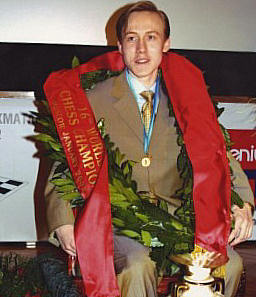In the period between 1998 – 2004, FIDE determined its own champion with the help of a knockout tournament. FIDE World Championship 2002 was no exception. The Prague agreement and the unification of the title of the World Champion still lay far ahead. Therefore, FIDE continued to organize its separate cycle independently of the classical World Champion Cycle.
A total of 128 participants applied for the 2002 edition. Classical World Champion Vladimir Kramnik and the previous owner of that title and the number one player in the world at the moment, Garry Kasparov, refused to participate. The rest of the players qualified mostly through continental qualification events or the average ELO rating throughout the determined period of time.
The battle for the first place consisted of seven rounds. The rounds were organized as the knockout matches:
- During the first five rounds, players played two classical games between each other (75 minutes for the first 40 moves and additional 15 minutes for the remainder of the game, with the 30-second increment after each move).
- If the score was equal, the tiebreak was held, consisting first of the two rapid games (20 minutes + 10 seconds per move), then additional two blitz games if required (5minutes + 10 seconds per move) and finally, an Armaggedon game, in which the White player has 6 minutes against Black’s 5 minutes, but if Black draws he wins the game and the match as a whole.
The semifinals (round six) and the final (round seven) were held as best of four and best of eight, respectively, with the same tiebreak conditions.
Due to the great number of players and a huge number of games required, the tournament was held in two stages. The first six rounds were played between 27th November and 14th December 2001, while the final match started on 16th January and ended on 23rd January 2002.
The tournament format was severely criticized, especially by Garry Kasparov. The complaints claimed that lower amount of games increased the effect of „luck“, that faster time controls reduce the quality of the games and that it makes no sense to determine the Champion of the World in classical chess with the help of the rapid or blitz.
(These complaints are topical even today, as the recent tiebreaks in the Carlsen – Karjakin match once again started arguments in the chess world.)
Anyway, the results of the tournament confirmed the validity of the complaints to an extent, because there was a huge number of surprises throughout the tournament (for instance, Peter Leko, the fifth seed and future World Championship contender lost to Ashot Anastasian, the 69th seed, in the second round).
Also, the final winner of the event was a new name. The FIDE World Championship title was captured by the 18-year-old superstar Ruslan Ponomariov, who prevailed over his compatriot Vassily Ivanchuk after winning games one and five in the final. Ponomariov, rated „only“ 2684 at the time, was the 19th seed in the tournament. Although he broke the world record by gaining his grandmaster title at 14 years of age, his result in the tournament was a huge shock for the chess world.

